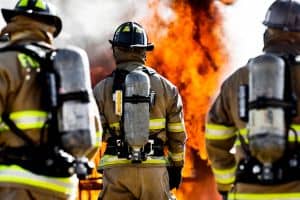When you think of government jobs, the first titles that might come to mind are correctional officers, data entry clerks, or tax specialists. Where–if anywhere–do firefighters fit among that list? Is firefighting a government job?

Firefighters can work federally in a government role or municipally, where a state, county, city, or town hire them. The differences between municipal and federal firefighters are hours worked, types of fires combatted, and salary.
This article will further explore firefighting as a government job, so make sure you keep reading!
Table of Contents
What Is a Federal Firefighter?
Firefighters are not all the same. There’s an important distinction between them depending on who hires them.
A municipal firefighter, for example, works for a fire department in their city, town, county, or state. A federal firefighter works for the state government.
As we’ll soon explain, while government and non-government firefighters hold the same job–combatting fires, investigating the causes of fire, and spreading fire safety–the nuances of the role vary depending on the level a firefighter works.
The Differences Between Federal and Municipal Firefighters
Let’s delve deeper into the disparities between municipal and federal firefighters per the intro.
Hours Worked
The average municipal firefighter works for 56 hours every week. Usually, this is divided into a 24 or 48-hour shift at the fire station, where the firefighter will work but can also sleep, eat, train, and keep the place clean. They must stay at the station.
Less popularly, firefighters might also work 12 or 14-hour shifts for several days in a row, followed by a few days off.
Federal firefighters work more hours, 72 hours per week, versus 56. The firefighter might work one 24-hour period, followed by another off with a rotating day, or two days on and two days off, three days on and four days off, or other variations of that schedule.
Pay Rate
Another difference between municipal and federal firefighters is income. A municipal firefighter’s earnings depend on local factors, such as cost of living, local wages, and demand.
Government or federal firefighters receive a regulated, consistent salary no matter where in the country they work.
Are firefighters blue collar workers? Click the link to check out the article on the site.
Fires Fought
The last difference between government and municipal firefighters is the types of jobs they do. Federal firefighters get sent to combat wildfires and wildland and structural fires. Municipal firefighters handle emergencies, including urban fires at residences and commercial buildings.
How to Become a Federal Firefighter
Are you interested in working as a federal firefighter? Here is more information about how to launch this stage of your career.
Education
You must have at least a high school diploma or GED. Further, as an aspiring federal firefighter, you need CPR and first aid certification and must pass a class on wilderness survival at a college level.
If you’re hired by the military as a federal firefighter, you can skip the college coursework since you will have undergone Department of Defense training.
Physical Requirements
You must be capable of carrying a backpack weighing 45 pounds and walking for three miles without taking a break. Other tests might be required to test your physical endurance.
Medical Requirements
As an aspiring firefighter, you must be in optimal health to work federally. You must undergo a health examination focusing on the throat, nose, and ears, including a hearing test. You must also consent to a vision test.
You must have all your limbs with the appropriate number of digits and no serious neurological, spine, heart, or lung conditions.
Ever wondered if firefighters are required to be vaccinated? Click the link to check out the article about firefighters and vaccinations.
Training
Working as a federal firefighter requires you to undergo fire behavior and safety training. You may receive training from the Department of Defense or a military branch to expedite the process.
Is It Better to Work as a Federal or Municipal Firefighter?
Now that you understand the ins and outs of municipal and federal firefighting, the question becomes, which is the right career choice for you?
That will depend on what’s available in your area. Provided you have your choice, you must consider some factors.
For example, there’s training. While many overlaps exist between federal and municipal firefighting, the former is more difficult and intensive.
Don’t get it twisted, though. You must be in tip-top physical and mental shape for municipal or federal firefighting.
You will work longer hours as a federal firefighter but only be called for specific jobs. Municipal firefighters may be busier on an average day, while a federal firefighter will pour in the most hours during wildland emergencies.
The pay is usually commensurate to a federal firefighter’s hours worked, but not exclusively. Some federal firefighters earn less than their municipal counterparts, but this is usually the exception, not the norm.
The benefits for federal firefighters are often better. You might also have the option of buying back time if you have a long enough career that you can use toward retirement.
We recommend you research fire departments in your area on a federal and municipal level to learn what kind of training is required for the job, the hours you’d work, and the income you’d earn, as that will help you make a decision you’re pleased with.
Bottom Line
Firefighting can be a government job. Federal firefighters work longer hours and usually have higher pay than municipal firefighters. They also work on structural, wildland, and wildfires versus a municipal firefighter combatting urban fires.
It’s more difficult to become a government firefighter, but the job has benefits and sometimes more stability.
However, what one’s experience is in a federal versus municipal firefighting job varies, so always do your homework before making a career decision.